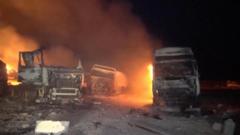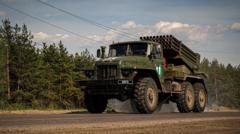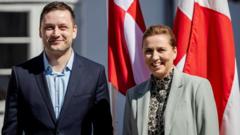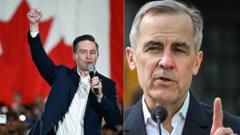Russian military officials assert their dominance in the Kursk region after months of conflict, but Ukraine disputes these claims, emphasizing continued operations. International perspectives vary on the developments, with implications for future negotiations in the ongoing war.
Russia Asserts Control Over Kursk Region Amidst Ongoing Ukrainian Resistance

Russia Asserts Control Over Kursk Region Amidst Ongoing Ukrainian Resistance
Russia claims to have regained full control over the Kursk region, a statement challenged by Ukraine, indicating a complex battlefield dynamic.
In a recent video meeting with President Vladimir Putin, Russian military chief Valery Gerasimov announced that Russia has regained full control over the Kursk region, refuting Ukrainian assertions to the contrary. Gerasimov claimed that the last Ukrainian-held settlement, the village of Gornal, has been "liberated," signaling a significant milestone in the ongoing conflict eight months after Ukraine's incursion into the area.
The announcement was met with skepticism from Ukraine, which continues to assert that its forces are still active in the region, dismissing Moscow's statements as "propaganda tricks." The spokesperson for Ukraine's military elaborated that their troops are managing a difficult situation, maintaining some positions in Kursk while continuing operations in the neighboring Belgorod region.
U.S.-based think tank, the Institute for the Study of War (ISW), reported on April 25 that Russian forces had made advances near the border in the Kursk Oblast, aiming to displace Ukrainian troops who have made limited gains in the area. The situation in Kursk has escalated, marked by heavy drone attacks and the deployment of approximately 70,000 Russian troops.
During the video call, Putin echoed Gerasimov's sentiments, declaring Ukraine's efforts a "complete failure" that may facilitate further Russian moves on other fronts. He also acknowledged North Korean troops for their support, marking a significant moment as this is the first official recognition of their involvement in the conflict by Russia.
Meanwhile, speculations regarding peace negotiations are intensified amid recent diplomatic discussions led by U.S. President Donald Trump and Ukrainian President Volodymyr Zelensky. Trump insinuated that both countries might be "very close to a deal," although he subsequently questioned Putin's intentions following recent attacks on Kyiv that resulted in civilian casualties. Ukraine remains resistant to potential territorial concessions that could arise in any peace talks, particularly regarding the Crimean peninsula.
As both sides continue to engage in military and diplomatic maneuvers, the struggle for Kursk reflects broader tensions in the war, with control over the region possibly serving as a strategic bargaining chip for Ukraine in future negotiations. The international community remains attentive, as the conflict evolves and impacts geopolitical relations across the region.
The announcement was met with skepticism from Ukraine, which continues to assert that its forces are still active in the region, dismissing Moscow's statements as "propaganda tricks." The spokesperson for Ukraine's military elaborated that their troops are managing a difficult situation, maintaining some positions in Kursk while continuing operations in the neighboring Belgorod region.
U.S.-based think tank, the Institute for the Study of War (ISW), reported on April 25 that Russian forces had made advances near the border in the Kursk Oblast, aiming to displace Ukrainian troops who have made limited gains in the area. The situation in Kursk has escalated, marked by heavy drone attacks and the deployment of approximately 70,000 Russian troops.
During the video call, Putin echoed Gerasimov's sentiments, declaring Ukraine's efforts a "complete failure" that may facilitate further Russian moves on other fronts. He also acknowledged North Korean troops for their support, marking a significant moment as this is the first official recognition of their involvement in the conflict by Russia.
Meanwhile, speculations regarding peace negotiations are intensified amid recent diplomatic discussions led by U.S. President Donald Trump and Ukrainian President Volodymyr Zelensky. Trump insinuated that both countries might be "very close to a deal," although he subsequently questioned Putin's intentions following recent attacks on Kyiv that resulted in civilian casualties. Ukraine remains resistant to potential territorial concessions that could arise in any peace talks, particularly regarding the Crimean peninsula.
As both sides continue to engage in military and diplomatic maneuvers, the struggle for Kursk reflects broader tensions in the war, with control over the region possibly serving as a strategic bargaining chip for Ukraine in future negotiations. The international community remains attentive, as the conflict evolves and impacts geopolitical relations across the region.























